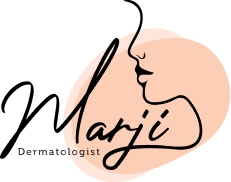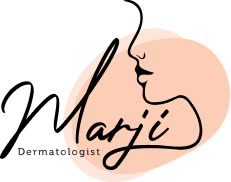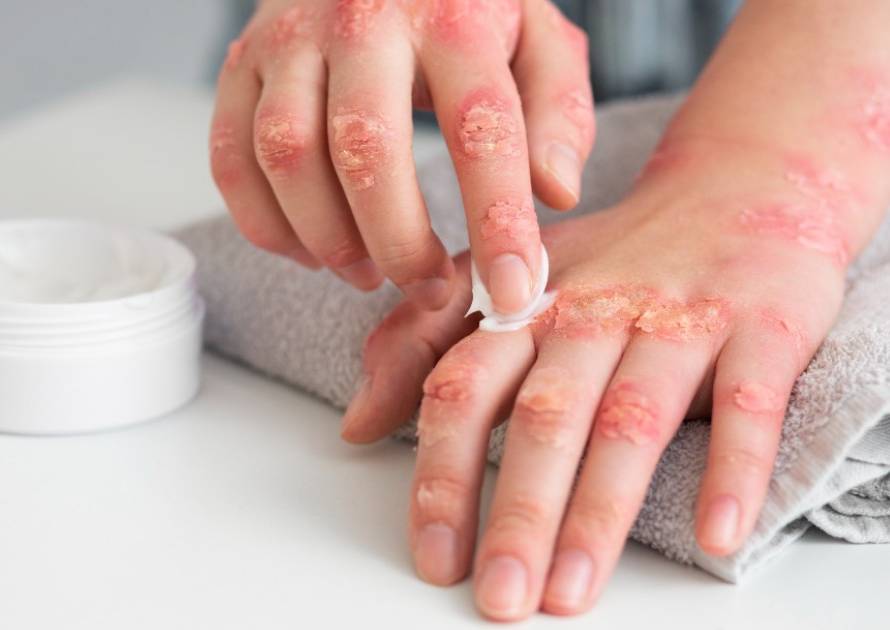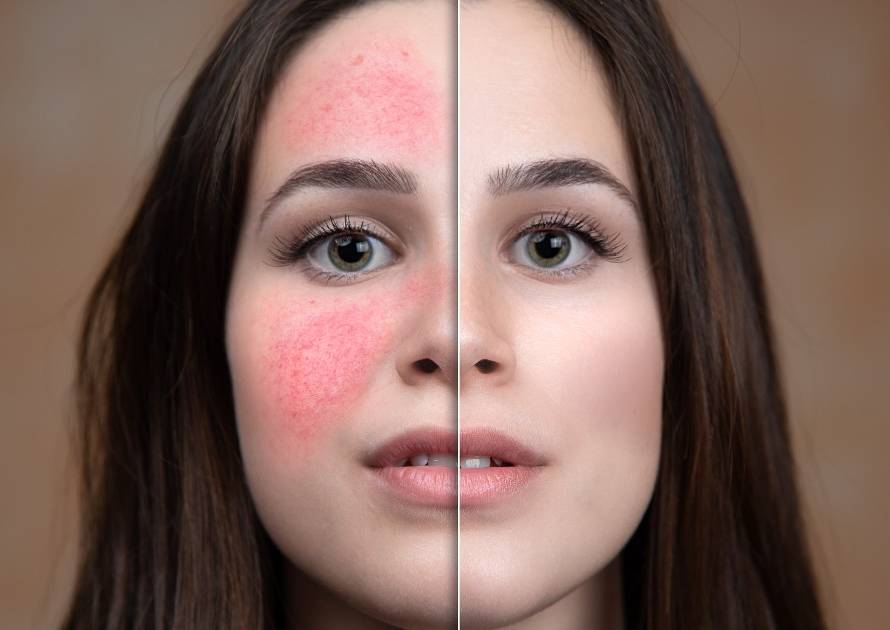Acne is one of the most common dermatologic diseases that affect people of all ages and genders. However, it is more common in teenagers as it affects almost 85% of teenagers. It is an annoying condition that causes patients a lot of embarrassment and self-consciousness.
Acne is a skin condition that happens when your hair follicles become plugged with oil and dead skin cells. It usually results in whiteheads, blackheads, or pimples (papules and pustules). Fortunately, many treatments are available to treat acne nowadays. Even though acne can be persistent, pimples and bumps heal slowly, and when one seems to go away, another appears to crop up. Acne occurs on the face, chest, and back, and in order to treat it, it is better that you see a dermatologist.
Acne can cause patients emotional distress and scars where it initially cropped up. It has been proven that the earlier you start treatment, the lower your risk of such problems.
Stages of Acne
There are four stages of acne that patients usually suffer from. Here is what you need to know about each stage:
Stage 1: Mild Acne
This stage of acne usually consists of a small concentration of pimples or/and blackheads on the skin. It usually is not inflamed, and it does not occur on a daily basis.
Stage 2: Moderate Acne
Moderate acne usually consists of blackheads, pustules, papules, and pimples on the skin.
It happens more frequently, and there may be some redness or inflammation around the affected area.
Stage 3: Moderate to Severe Acne
The third stage of acne is usually inflamed, with the skin looking red and irritated. Cysts, papules, and nodules may also be present in this stage.
Stage 4: Severe acne
When acne reaches its most severe stage, it becomes extremely painful. There would be numerous pustules, cysts, papules, and nodules in the affected area or on various parts of the body. During this stage, many people suffer from scars following the appearance of cysts, papules, pustules, and nodules.
Variants of Acne
Acne has many different variants for all ages and genders, including:
- Neonatal acne: This is a type of acne that occurs in newborns and Infantile. It is common, affecting 25% of infants younger than six weeks.
- Acne fulminans: This type of acne usually affects teenage boys with rapid and severe acne associated with systemic symptoms. This type of acne is thought of as an immunologically induced disease. The elevated level of testosterone causes a rise in sebum and bacteria.
- Acne Mechanica: This type of acne happens due to frequent mechanical friction or pressure on the skin; for example, this acne is common in violinists.
- Adult acne: Adult acne is more common in older women than in older men. It tends to be more on the chin and more resistant to treatment. It usually results from different things like hormonal changes, stress, smoking, diet, and family history.
- Drug-induced acne (DIA): This acne is caused by medication intake. Medications like vitamin b12 injections, corticosteroids, lithium, oral contraceptives, and many more can cause acne eruption.
- Mask-acne or maskne: This is a new term after seeing acne eruption due to wearing face masks after the COVID pandemic. This type of acne results when a person wears their mask for more than six hours without a break. It’s usually caused due to an allergic reaction to the mask’s material or because the mask traps humidity which causes sebum and dead cells to clog up your pores.
Acne Developments Factors
There are many factors that affect the development of acne; here are some of those factors:
- Gender: Because men produce more of the hormone testosterone than women, it results in thick and oily skin. Moreover, the production of sebum, or oil, is also higher in males because their sebaceous glands are more active due to testosterone, leading to clogged pores, and causing more breakouts.
- Age: Acne breakouts most commonly begin in teenagers from 10 to 13 years old. It usually lasts for around five years, and it is more common and severe in boys (due to the testosterone hormone) than in girls.
- Occupation and hobbies: If your daily activities include a lot of sweating exposure to oils, dirt, and bacteria, it is more likely that you’ll develop acne breakouts.
- Skincare routine: Using skincare products that are not suitable for your skin type can cause more problems than it solves. Make sure to consult your dermatologist to find out the best type of skincare products to use and how to use them.
- Makeups: It is no secret that makeup clogs up your pores and causes acne breakouts. Make sure that you apply breathable makeup and clean your face very well after applying makeup products.
- Medications: Medications like vitamin b12 injections, corticosteroids, lithium, oral contraceptives, and many more can cause acne breakouts.
- Medical illness: Medical conditions that are related to hormones, like polycystic ovarian diseases cause acne eruption.
- Family history: Acne can sometimes be hereditary. If your siblings have acne, you are most likely to develop acne as well.
Instructions to Prevent Acne
There are several things that you can do in order to prevent acne breakouts or make your breakouts less frequent. If you have acne, or a history of acne, this probably means your skin is oily. Therefore, all the products you want to use on your face must be for oily skin. Oily skin products are usually oil-free and non-comedogenic, which helps with eliminating acne risks.
You need to properly wash your face, moisturize it and use a good sunblock. As for white and black, comedones need to be removed mechanically as they poorly respond to treatments. Moreover, recurrent injury or itching of the acne lesions causes delayed healing and increases the risk of scarring and hyperpigmentation.
Treatment of Acne According to Stage
Different types of acne require different methods of treatment. Here is what you need to know about the different types of treatment:
Mild Acne
This type of acne can be treated with topical creams (vitamin A derivatives or acids). The patient needs to start with it and then gradually increase it to the frequency and duration recommended by the doctor.
When you’re using topical creams, avoid thin skin areas such as the area around the eyes and the angle of the mouth and nose.
Moderate Acne
This type of acne can be treated with topical creams, like mild acne, in addition to oral antibiotics to eliminate inflammation and infection.
Severe Acne
With this type of acne, dermatologists use oral isotretinoin. This medication should only be given under medical supervision. Tests must be done before starting the medication and regularly afterward during the course of the treatment in order to adjust the dose.
The dermatologist would determine your daily dose to optimize the results and control the side effects. You need to continue with the medication until you reach a total accumulative dose of 120 mg/kg.
Medication Side Effects
Every medication has its own side effects, and acne medication is no exception. Here are the most common acne medication side effects:
- Dryness of mucous membranes and skin.
- Elevation of live enzymes and lipids that regular labs and dose adjustment can monitor.
- Muscle ache, especially with heavy exercise.
- The medications could be teratogenic if taken duration the pregnancy.
- Increased photosensitivity.
Oral Isotretinoin Instructions
Here are the instructions that dermatologists recommend in order for you to get the best possible results:
- You must take the medication daily after your main meal.
- Make sure to hydrate your skin regularly.
- Make sure to use moisturizing eye drops regularly.
- Try regularly using lip balms to keep your lips from getting too chapped.
- Avoid getting pregnant during and after one month of taking the medications.
- Avoid heavy exercise.
- Avoid blood donation as the blood might be given to pregnant women.
Treatment Sessions for Acne
There are different treatments that you can get performed at the dermatologist’s clinic, including:
- HydraFacial: This is a patented skin treatment available in medical spas and dermatology offices. It works to deep-clean, exfoliate, and hydrate your skin. This professional procedure may help treat various skin conditions, including acne, dryness, and wrinkles.
- Chemical Peeling: This is a procedure in which a chemical solution is applied to the skin to remove the top layers. The skin that grows back is smoother.



